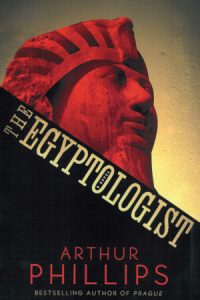Kansas City Star Interview
The Kansas City Star — October 3, 2004
Arthur Phillips isn’t shy about taking a novel approach
By JOHN MARK EBERHART

It’s the kind of cryptic, playful statement Arthur Phillips loves to make. One must pay close attention to him at all times – or risk the disquieting feeling that he has managed to stand you on your head without your noticing it.
The “ending” in question is the surprise denouement of his new novel, The Egyptologist. In an interview earlier this year at Chicago’s BookExpo America, Phillips confessed it was the book’s conclusion that came to him first.
“So I basically wrote it backwards,” Phillips said. “I’ve heard John Irving say he does that as well, but I didn’t quite know what he meant; I didn’t get it. But I just had (this) idea … and I thought, ‘Whatever it’s going to take to get to that, I have to do it.”
In a world in which “straightforward” fiction has become the rule – think Kent Haruf’s Plainsong – Phillips has refused to comply. His acclaimed 2002 debut novel was called Prague, but the title itself was something of a tease, for in these impasto pages the reader was forced to grapple with the history of Budapest, with expatriate Americans, with references to jazz, sexuality, academia and more.
The Egyptologist concerns a 1920s explorer who’s seeking the tomb of an Egyptian king. That sounds regular enough, till you glean that Phillips’ Ralph Trilipush is fascinated with the fragments of smutty poetry attributed to Atum-Hadu. A novel featuring archaeology and penis jokes: How can it miss?
“It was great fun to do this,” Phillips said. “I got to invent explorers, a pharaoh and mistranslations of smutty hieroglyphs. It was fantastic.”
Oh, and if that isn’t enough for you, try writing the author’s name and that of his chief narrator on a piece of paper. Look closely at them. I’ll say no more.
Despite the cosmopolitan nature of his novels, Phillips, 35, is no Army brat; he has not visited every remote spot on the globe. He was born in Minneapolis and grew up there, in decidedly conventional circumstances.
“I was cursed with a happy childhood and nice, loving, supportive, intelligent parents, and I may never be able to shake that awful burden. But … it is a natural contrariness that I have. I don’t want to write a nice book about family and family issues and dysfunction, because other people are already handling that very well. Not to criticize; I just don’t feel like I can march in there and find something new.”
Likewise, Phillips simply is not very interested in writing autobiographical fiction.
“I don’t feel any pressure to turn to my own life experience for any fiction right now. I may someday, and I don’t think any less of doing that; it’s just not where my spirit has taken me, I guess.”
Instead, Phillips delights in the act of artistic conception.
“It’s an egotistical challenge, and it’s just fun. Writing offers all kinds of pleasures, some of which are parallel to the pleasures of reading and some of which aren’t – and the ones that aren’t include just amusing yourself by creation. It’s a tiny little bit of God envy, I guess.”
Even his narrative style can be unusual. Most literary critics would agree that the epistolary approach – that is, the writing of a novel whose narrative depends largely on purported letters, diary entries and the like – is an anachronism. Sure, Bram Stoker did it in Dracula, but that was in the 19th century. Yet this is the technique Phillips has employed in The Egyptologist.
“I spent two awkward weeks going through all my narrative options,” including first-person, third-person omniscient and others, Phillips said. “And nothing fit. Nothing got me everything I wanted, except this.”
One of his goals was to create a story that avoided the “too speedy” feel of modern narratives, especially the third-person omniscient. The scheme of telling the tale through a series of letters and other written materials forces Phillips’ characters – and readers – to learn things in epistolary increments, and also provides “a retro patina.”
Such methods can be risky. Some readers of Yann Martel’s Life of Pihave objected to the ambiguity of that novel’s narrative. And the tricky conclusion of Ian McEwan’s Atonement absolutely infuriated not a few bookish folk who felt they’d been cheated somehow out of the “real” book.
Phillips, though, defends richness and complexity in literature.
“I am of the diversity and inclusion school of the book – that the more ideas and the more styles … the merrier. There has to be room in a well-read world for the whole spectrum, between (Charles Frazier’s ) Cold Mountain and Atonement. Besides, even Cold Mountain is a piece of literary gamesmanship.”
He’s also comfortable with the idea that some readers aren’t interested in authorial skulduggery but adds that being open to experimental books can be rewarding.
“(Maybe) you don’t happen to like one of the possible flavors of food. Well, OK, you don’t have to like it. But it doesn’t make strawberries immoral; it just makes them something you’re allergic to.”
Phillips’ range may have something to do with his artistic background. He was a child actor, mostly for the stage, in Minneapolis, and later was a jazz saxophonist and singer. Clearly, though, writing is his favorite role. Fans will be delighted to know that he’s at work on his third novel.
“It’s still in first draft, and it seems to be a Victorian ghost story.”
His research for the yarn included the supernatural works of Robert Louis Stevenson, Charles Dickens and Mary Shelley – and Stoker’s Dracula, which he insists he read after concocting the epistolary structure of The Egyptologist. And he especially enjoyed a Victorian anthology that featured Stoker’s magnificent short story “The Judge’s House.”
He also read Henry James’ The Turn of the Screw. Will Phillips’ ghost story, like James’ before it, set up a tension in which the reader wonders if the strange happenings are truly supernatural or are explainable by abnormal psychology or some other label?
“I have been bouncing that around a lot – and I think that I am by nature prone to making the supernatural debatable.”
Ah, ambiguity again. All right, Kansas City readers, that’s the best I can do. Now it’s your turn: Phillips will be in town Thursday to sign and discuss The Egyptologist – and take questions from you. (See accompanying box.)
Remember, though, that I’ve warned you: By the time Arthur Phillips has finished answering your query, you might have more questions than you did when you started him up.

